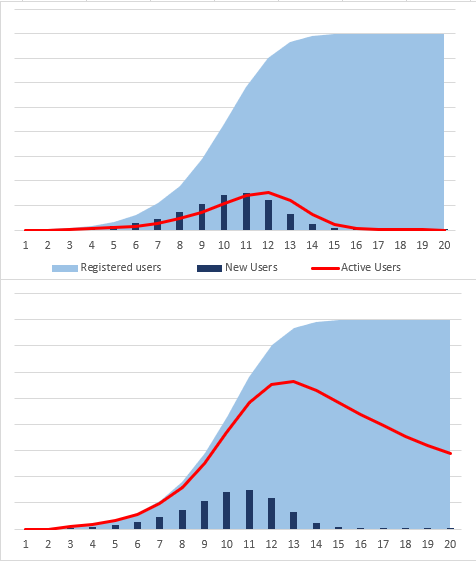- ARPDAUPosted 13 years ago
- What’s an impressive conversion rate? And other stats updatesPosted 13 years ago
- Your quick guide to metricsPosted 13 years ago
Avoiding the Hippo in the room (or why large video game projects with charismatic leaders fail)
The BBC today ran a story about how to avoid the Hippo.
The Hippo is the highest paid person’s opinion. It’s extremely dangerous. That person may not actually know the most, or be in position of all the facts. They are often very busy. But the CEO or the studio head or the Game Director is an important person, and their opinion often wins.
I come across this a lot in my consultancy practice, particularly when working with studios which are making the transition from boxed product to service-based games.
In or Out v. Now or Later
In the old days of boxed products, the Gold Master was everything. If a feature was in the build when the game was mastered, it was in the final game. If it wasn’t, it was over. This was before the days of patches, DLC and continuous support. Getting to gold master was a tough process, with the whole team working hard, and sometimes crunching. Producers were always looking for features to cull to make hitting the deadline easier, or even possible.
In that environment, it was dangerous to admit that your pet idea was not perfect. If you showed weakness, or deviated from 100% support of your own ideas, they would die in the bitter crucible of crunch, never to see the light of day. Some developers understood that this was necessary to be able to ship the game. Others took a different lesson: never, ever, ever admit that your idea or feature might have a weakness if you want it to appear in the finished game.
Most of us will have worked with someone who thinks like this: who won’t let go of their ideas, or admit weakness. Worse, they pounce on anyone else’s admission of weakness in a design as an excuse to kill the feature, not as an opportunity to improve the design, the feature or the game.
In that mindset, a feature is either In or it is Out. There is no middle ground.
In the world of service-based games, this is much less true. Development of a service game can continue for several years after the game has shipped. The testing phase might be very long, and new features might be being deployed during the testing. This is a time when developers are less obsessed with whether a feature is In or Out; they are focused on whether they should be focus on the feature Now or Later.
Now or Later doesn’t mean that you should take everything piecemeal, without keeping a clear eye on the overall design. It does mean that features can evolve and develop, and “weak” ideas can be improved and iterated, or even rejected and resurrected, until the whole game is better. It means that everyone can put forward designs, even if they are not confident, and the whole group can improve them, or grab an idea later, when a specific problem with the game comes to light.
High status leaders are a prediction of failure
The BBC report is based on
a PhD thesis that studied 349 video game projects with 179 producers from 17 companies. They then concluded that when a project has a high status leader, the final project has a higher variability in its success: in other words, it is more likely to fail, as well as more likely to succeed, than a project with a low-status leader. The thesis concludes that perhaps high status leaders get so much support and unquestioning obedience that no one is brave enough to challenge the decisions in the organisation or project, and a project where the leader is unchallenged no longer benefits from the diversity of views, skills and talents that an engaged and communicative team can provide.
The thesis cites the example of George Broussard and Duke Nukem Forever, but you could easily substitute Dave Jones at Real Time Worlds or more recently Mind Candy’s difficulties in shifting Moshi Monsters from browser to mobile as examples.
The key to remember, for all readers, is that while it is important for a game to have clear vision and direction, it is important that leaders get useful feedback from their team. If you are a team leader, and you haven’t changed your mind on something important in the last month as the result of something a team member has told you, go and have a long, hard look in the mirror.
There is a real danger that you are, in fact, a hippo.
Photo credit: LongitudeLatitude













